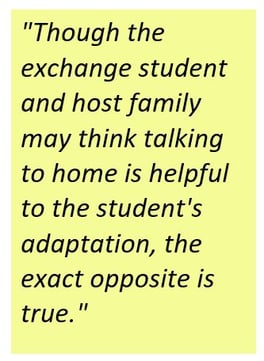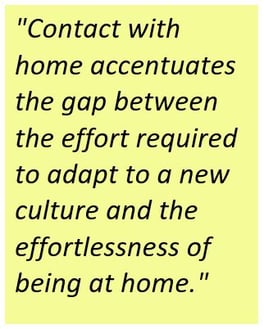Your exchange student is living thousands of miles from home for an extended period of time. Virtually everything is different from what they are used to, and they are constantly having to adapt—to new customs, new people, new foods, a new language, a new school--and this year, a pandemic. On top of all this, they are young, and in most cases, this is the longest they’ve ever been away from home. It’s only logical that they will sometimes feel homesick, discouraged, frustrated, or all of the above. A natural response is for the student to want to communicate with home. But will reaching out to family and friends at home help? Or harm?
ICES recommends that students limit their contact with home to a maximum of one hour per week. Many students—and their host families—ignore this recommendation because they don’t think contact with home will hurt the student’s exchange experience. In fact, many hypothesize that communicating with home will actually help the exchange student overcome homesickness and culture shock.

In response to the one-hour-per-week recommendation, exchange students often say: Talking to my friends and family doesn’t make me homesick. It makes me feel better!
And from host families we often hear: If my child were so far away, I’d want them to be able to contact me anytime they want.
 I was an exchange student myself, and two of my children have been exchange students, so I can certainly relate to both of the above perspectives. However, working as a coordinator of exchange students for many years, I continually see the clear correlation between frequent contact with home and increased culture shock. Though the exchange student and host family may think talking to home is helpful to the student's adaptation, the exact opposite is true.
I was an exchange student myself, and two of my children have been exchange students, so I can certainly relate to both of the above perspectives. However, working as a coordinator of exchange students for many years, I continually see the clear correlation between frequent contact with home and increased culture shock. Though the exchange student and host family may think talking to home is helpful to the student's adaptation, the exact opposite is true.
Let me explain with a story. . .
Olympic swimmer Michael Phelps had a regular diet of around 12,000 calories per day when he was in training. That number is not a typo. That is what his metabolism required for health and energy during training.

Now let’s say Michael stops swimming and takes a desk job. He understands that his caloric intake must be reduced, so he cuts back to 8,000 calories per day. After Day 1 on the job, all is well. He feels good and normal. On Day 2, he again eats 8,000 calories. Again, things seem good. After a week, he notices that his pants are getting a little tight. Darn dryer is shrinking my pants, he thinks. Eventually, there will be no denying that 8,000 calories per day is not compatible with his desk job, and he will need to adjust. By failing to make this adjustment sooner, he created a new problem—a wardrobe that no longer fits.
For an exchange student, the problems related to contact with home transpire much like the above story. When an exchange student is in their home country, spending a lot of time with family and friends is indeed a good, healthy thing. However, once the student is in the host country, contact with home will affect them very differently, and it’s important to understand these points:
- The negative effects of too much contact with home will not be immediately obvious. At first, it seems to make the student happy, and they often believe it is helping them adjust. The consequences often appear later.
- Students often attribute their challenges to something else. Just as the dryer didn’t shrink Michael’s pants, the real problem usually isn’t the host family's rules or the lack of things to do, but this is where students feel the pinch.
- Students reduce their contact, but not enough. They conclude that since they are talking with their family and friends far less than they did when they were at home, it will be enough to limit their contact to an hour of Skype on Sunday….and a quick call on Wednesday….and three additional emails during the week….and a few chats on Facebook….and a couple texts each day. This is too much contact with home and will eventually cause adjustment issues.

 Being an exchange student requires adapting to many new things. Most students find it more challenging than they thought it would be. I certainly did. It’s true that talking with home can soothe the soul, but it is a temporary fix. To explain, let’s continue with our story. . . .
Being an exchange student requires adapting to many new things. Most students find it more challenging than they thought it would be. I certainly did. It’s true that talking with home can soothe the soul, but it is a temporary fix. To explain, let’s continue with our story. . . .
Let’s say Michael hires a trainer to help him get back into his old jeans. The trainer tells Michael that he can no longer eat three chocolate bars each day. Michael is not too excited about this because he really loves chocolate. He comes up with a plan: Whenever he starts to crave chocolate, he will take out a chocolate bar and smell it as he eats carrots and celery. He reasons that the familiar smell will satisfy his craving. Do you think this plan will work? Of course not. Putting what he loves right under his nose yet still out of reach will only increase his desire for chocolate and increase the pain of not being able to have it. Smelling chocolate while eating celery will only highlight the fact that celery is not chocolate. Any good trainer would tell Michael to overcome his chocolate habit by
- finding a healthy substitute to eat in its place
- choosing an activity to distract his mind when he craves chocolate
- allowing himself to occasionally indulge in chocolate

When exchange students communicate too much with friends and family from afar, it emphasizes--if only subconsciously--the fact that they can not be with them, and it makes the cultural challenges seem more pronounced. It highlights the differences between home and host country. Contact with home accentuates the gap between the effort required to adapt to a new culture and the effortlessness of being at home.
 Excessive communication with home wastes valuable time that could be spent making forward progress toward integration into the host culture. Minutes and hours spent on calls, messages, and video chats with home would be better spent engaging in the host culture, improving language skills, making friends, and growing into a real member of the host family. Exchange students benefit most from their exchange when they wisely invest their time into that which brings them closer to the goals of the exchange.
Excessive communication with home wastes valuable time that could be spent making forward progress toward integration into the host culture. Minutes and hours spent on calls, messages, and video chats with home would be better spent engaging in the host culture, improving language skills, making friends, and growing into a real member of the host family. Exchange students benefit most from their exchange when they wisely invest their time into that which brings them closer to the goals of the exchange.

The recipe for successful adaptation is the same three points listed above:
- Find an appropriate substitute. Students must work to develop a bond with their host family and to make friends so they have a support structure here.
- Stay active to keep the mind off of home. Play a sport, take up a hobby, volunteer, spend time with the host family.
- Indulge occasionally. It’s fine for a student to look forward to that weekly call home. Encourage students to work to fill their week with new experiences so the call will be a happy time of sharing and not a downer call of mourning the distance.
Limiting contact with home is challenging but worth the effort, and in the end it will help the student adapt more quickly and more completely.


